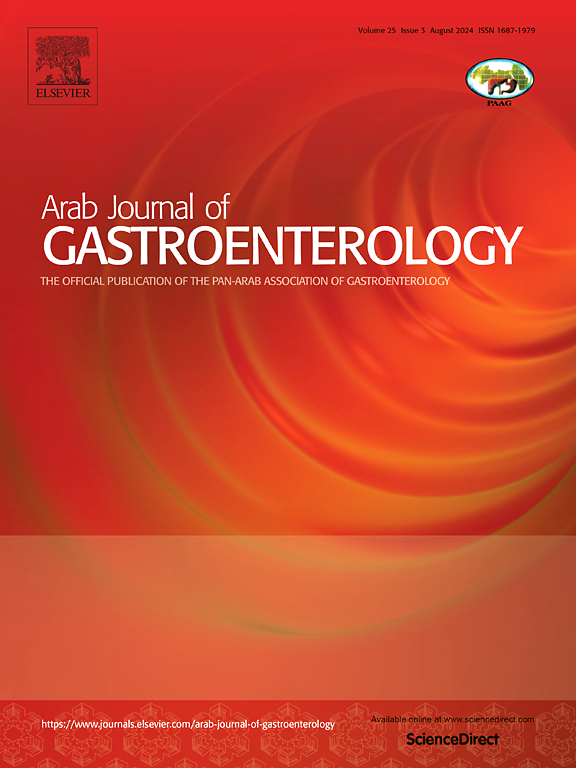将阿拉伯文炎症性肠病盘作为评估约旦炎症性肠病患者残疾状况的工具。
IF 1.1
4区 医学
Q4 GASTROENTEROLOGY & HEPATOLOGY
引用次数: 0
摘要
研究背景和目的:炎症性肠病(IBD)是一种慢性复发性胃肠道疾病。IBD 会严重影响患者的生活质量,应采用灵活简便的方法对其进行评估和监测。IBD-残疾指数(IBD-DI)是评估 IBD 患者残疾状况的唯一有效工具,但在临床实践中很难使用。IBD Disk 是 IBD-DI 的一种新的简易自测版本,可对 IBD 患者进行快速评估,并跟踪疾病负担随时间的变化。然而,约旦尚未在临床实践中使用 IBD Disk。本研究的目的是将 IBD Disk 翻译成阿拉伯语,并将其引入约旦的临床实践中:将原版 IBD Disk 翻译成阿拉伯语后,从 2021 年 9 月至 2022 年 3 月,在约旦 Al-Salt 的新 Al-Hussein 医院门诊或住院的 IBD 患者填写了翻译后的 IBD Disk:共有 50 名 IBD 患者(52% 为男性)参与研究并填写了 IBD 病历卡。患者很容易填写 IBD 盘。能量、排便调节和情绪是复发患者最不擅长的领域。在缓解期,IBD 盘平均得分的多边形面积有所减少。复发时,教育和工作与精力的相关性最强:结论:IBD 盘是 IBD 残疾的可靠视觉代表。在这项研究中,约旦首次在临床实践中引入了翻译成阿拉伯语的 IBD Disk。得分平均值多边形面积的缩小代表着疾病负担的减轻。本文章由计算机程序翻译,如有差异,请以英文原文为准。
Introducing the Arabic inflammatory bowel disease disk as a tool for assessing disability in patients with inflammatory bowel disease in Jordan
Background and study aim
Inflammatory bowel diseases (IBD) are chronic relapsing-remitting disorders of the gastrointestinal tract. IBD causes significant impairment in the patient’s quality of life that should be assessed and monitored in a flexible and easy way. The IBD-Disability Index (IBD-DI) is the only validated tool to assess disability in IBD patients, but it is difficult to use in clinical practice. The IBD Disk is a new shortened, self-administering version of the IBD-DI that allows quick assessment of IBD patients and tracks changes in disease burden over time. However, the IBD Disk has not been used yet in clinical practice in Jordan. The aim of the study was to translate the IBD Disk to Arabic language and introduce it in clinical practice in Jordan.
Patients and methods
After translating the original IBD Disk to Arabic language, IBD patients referred to outpatient clinic or admitted to the medical department at the new Al-Hussein hospital, Al-Salt, Jordan, from September 2021 until March 2022, filled the translated IBD Disk.
Results
A total of 50 IBD patients (52 % males) were included in the study and filled the IBD Disk. The IBD Disk was easy to complete by the patients. Energy, regulating defecation, and emotions were the most disabling domains for relapsing patients. Polygonal shape area of the mean for IBD Disk scores decreased during remission. Education & work and energy had the strongest correlation at relapse.
Conclusion
The IBD Disk is a reliable visual representation of IBD disability. In this study, a translated version of IBD Disk to Arabic language was introduced for the first time in clinical practice in Jordan. The reduction in the polygonal shape area of the scores’ mean represents decreased disease burden.
求助全文
通过发布文献求助,成功后即可免费获取论文全文。
去求助
来源期刊

Arab Journal of Gastroenterology
Medicine-Gastroenterology
CiteScore
2.70
自引率
0.00%
发文量
52
期刊介绍:
Arab Journal of Gastroenterology (AJG) publishes different studies related to the digestive system. It aims to be the foremost scientific peer reviewed journal encompassing diverse studies related to the digestive system and its disorders, and serving the Pan-Arab and wider community working on gastrointestinal disorders.
 求助内容:
求助内容: 应助结果提醒方式:
应助结果提醒方式:


